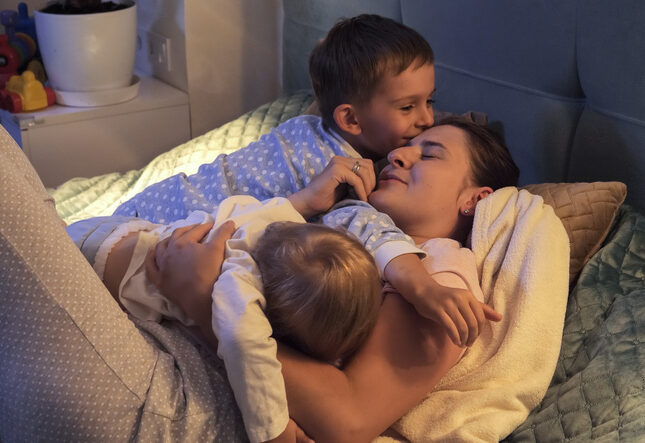Gaining independence and flourishing with our Supported Independent Living homes
September 20, 2022
For adults living with disability, it can be a challenge to gain independence while still receiving the support needed to flourish in life. That’s where Supported Independent Living can provide a solution.
CatholicCare Diocese of Broken Bay (CCDBB) provides two Supported Independent Living (SIL) homes, at Lindfield and Manly, with new ones to come online in North Balgowlah and on the Central Coast later in the year.
SIL is a person-centred model, typically providing residential accommodation for a small group of people with disability, who receive supports tailored to their particular needs and abilities.
General Manager, Disability & Seniors, Alex Jeloudev says CCDBB’s journey with SIL started some years ago when they took on the service delivery of Woods Cottage in Lindfield.
“It’s a wonderful story where the Catholic Parish of Lindfield had established a trust to provide better opportunities for people living with disability,” he says.
“And, facilitated by the Woods Trust, they purchased and maintained a property to provide supported accommodation for people with disability.
“A lot of amazing fundraising occurred through the parish to sustain it and all residents who currently reside in Woods Cottage are in fact original res idents.”
CatholicCare’s other SIL property, Manly House in Brookvale, opened for residents in December 2020. Home to eight people, it was the result of a partnership between CCDBB and a Specialist Disability Accommodation (SDA) provider, who, through the National Disability Insurance Scheme (NDIS) SDA funding built for-purpose properties with full accessibility for people with disability.
Participants of the NDIS work closely with their support coordinator, allied health practitioners, SIL provider and circle of supports to establish a roster of care to capture all their support needs across a 24/7 period.
“This process focuses on the individual client’s routines, preferences and abilities. NDIS providers like CatholicCare, use this information to form a SIL quote to the NDIA” Alex says.
“The NDIS has enabled clients to choose their provider of choice, and this has enabled positive outcomes for clients and families to choose providers who meet their needs. An example is that clients who have lived in group homes within a block funded model for most of their adult lives, now have the opportunity to move into SIL services of their choice. Some clients have chosen to move into individualised living options with in-home supports. These styles of living and supports allow people with disability to live as flexibly and independently as possible and have choice in how they live their lives”
Alex says there is strong interest in SIL from both CCDBB’s clients and external expression of interest from Support Coordinators, clients and families
SIL houses have a roster of support staff working with clients across a 24-hour period which includes sleepovers and active overnight supports depending on clients’ level of funding and supports required.
“Our staff would support clients with all their tasks of daily living, which may include morning routines of getting up out of bed, cleaning teeth, organising meals etc,” Alex says.
“But at the same time, they will also be focusing on client strengths and building capacity, supporting the learning of new skills and methods to help our clients to become as independent as possible.”
Kay and Alison have been residents at Woods Cottage in Lindfield for about 11 years and both appreciate the emphasis on helping them to grow, flourish and live a full life.
Kay, who has an intellectual disability and has recently retired from her work at a range of different supported workplaces, and also at the Nestle factory, says she enjoys a variety of activities with her Woods Cottage support workers, including walking some dogs from a local dog rescue to the vet.
“I love dogs,” she says. “I really like seeing the dogs.”
Kay says she also enjoys weekend outings, such as visits to the Koala Park and likes hanging out with her friends at Woods Cottage and going out for coffee.
She cooks one night per week, helps clean the house on Saturdays, and also enjoys time with her family.
“I love going to dancing too. I’ve got a concert on soon,” she says.
Alison, who also has an intellectual disability, lives at Woods Cottage and works two days per week in the kitchen at the Sydney Adventist Hospital in Wahroonga. She likes being independent and keeping active and is involved in an array of physical and social activities.
“I like bowling, swimming, going to Manly, ferry rides, the Easter show, the Aquarium,” she says.
“On Friday nights we have karaoke with Paul and I love that.”
Alison also enjoys cooking at home and lists a mouth-watering menu of culinary delicacies that she enjoys serving up to her house-mates.
Both Kay and Alison also look forward to the holidays they take together with their support workers to various parts of regional NSW.
Phoebe, who is one of the support workers at Woods Cottage says it’s a joy to accompany people like Kay and Alison on their journey of Supported Independent Living.
“Honestly, I work with the best four women here at Woods Cottage,” she says. “I love being with them. I always get a wave and a smile each day when I come into work. As you’ve heard, they’ve sometimes got a chaotic social schedule, but that’s all part of the fun!”
For more information please call 1800 324 924 or click here.
More news stories like this one
Thinking outside-the-box to house families in crisis
Housing a family in crisis presents many challenges. Read how two families in Sydney cope after escaping domestic violence.
Read MoreSupport without stigma – the non-clinical model of Dom’s Place
Discover how Dom's Place offers effective homelessness support without stigma, fostering a supportive and non-clinical atmosphere.
Read MoreWe’re empowering and connecting seniors via our seniors ministry collab
Discover the importance of empowering and connecting seniors through parish initiatives that build fellowship and support.
Read More



